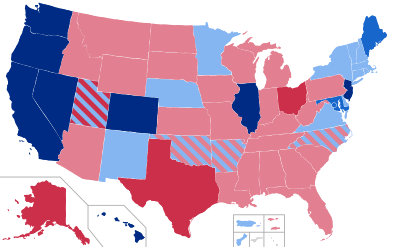This article's factual accuracy may be compromised due to out-of-date information. The reason given is: include the revisions in the Respect for Marriage Act. (December 2022) |


This article summarizes the same-sex marriage laws of states in the United States. Via the case Obergefell v. Hodges on June 26, 2015, the Supreme Court of the United States legalized same-sex marriage in a decision that applies nationwide, with the exception of American Samoa and sovereign tribal nations.
There are 29 states which have constitutions including bans on same-sex marriage or other types of unions, and 31 states have statutes that ban same-sex marriage or other types of unions although these are all defunct under the Obergefell ruling. In November 2020, Nevada became the first state to repeal its constitutional ban on same-sex marriage following Obergefell.
As of 2015, same-sex marriage is now federally legal in all fifty states due to a ruling from the Supreme Court. However, in the aftermath of the Dobbs v. Jackson Women's Health Organization ruling, statutory or constitutional bans on same-sex marriages have received renewed attention over its applicability should Obergefell be overturned.[1][2]
In December 2022, President Biden signed the Respect for Marriage Act. In the case that Obergefell is overturned and individual states outlaw same-sex marriages, the new legislation regulates that all states and US territories must recognize legal unions performed in states where they are legal. The Respect for Marriage Act was passed with bipartisan support in both chambers of Congress.[3]
- ^ Warner, Ryan (June 27, 2022). "In light of Dobbs decision, Colorado's LGBTQ community works to cement same-sex marriage into state law". Colorado Public Radio. Retrieved August 28, 2022.
- ^ Moreau, Julie (June 8, 2022). "What Roe v. Wade's end could mean for LGBTQ rights". NBC News. Retrieved August 28, 2022.
- ^ Gambino, Lauren; Smith, David (2022-12-13). "Biden signs landmark law protecting same-sex and interracial marriages". The Guardian. ISSN 0261-3077. Retrieved 2023-03-27.